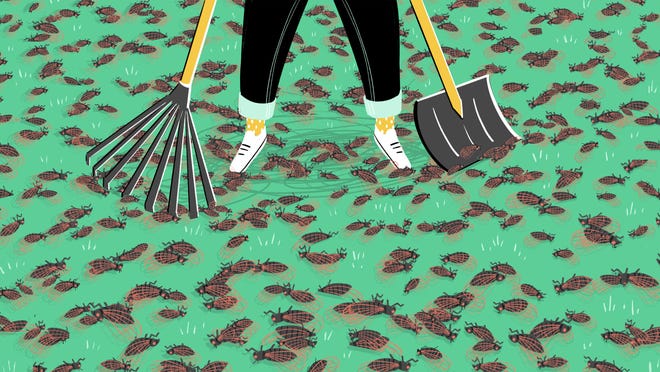

— Recommendations are independently chosen by Reviewed’s editors. Purchases you make through our links may earn us a commission.
Buzz about the Brood X cicada season has been building for months as residents of several states anticipate the emergence of trillions of 17-year-cicadas in late April and early May. For homeowners, this won’t go unnoticed, as male cicadas initiate their mating calls—a notoriously loud buzzing noise—to attract a mate.
Subscribe to Reviewed's Resources newsletter for tips, tricks and hacks to get through this together.
As part of the circle of life—which for cicadas is approximately 4 to 6 weeks—Brood X will die out. And, while their buzzing sound may cease, their physical aftermath inevitably includes trillions of cicada carcasses left behind.
Trust us when we say you will want to clean up your yard fast to avoid the apocalyptic look and some less-than-pleasant aromas. We’ve put together some tips for how to clean up your house and yard.
1. Work fast to clean up

Unlike annual cicadas, once periodical cicadas emerge, their lifespan is only 4 to 6 weeks. However, not all of the cicadas emerge from the ground at the same time—some may arrive earlier or later, depending on when the soil in your region reaches 65 degrees. Because of where the affected state is located, Brood X cicadas are likely to be active until the end of June or beginning of July.
Yard clean-up may be a frequent and continuous chore. Josh Matta, senior biologist for Spectracide, says you should work fast in cleaning up the deceased cicadas to avoid any potential scent. Strangely, some people have compared the smell of rotting cicada carcasses to hamburger meat, so try to start clean-up before any unwanted scents begin to appear.
2. Break out your yard tools

Depending on how affected your area is and how many dead cicadas land in your yard, there are several backyard tools you probably already have that can make clean-up easier.
For something on the smaller side, Matta says you can use a dustpan and handheld broom to quickly collect them.
With larger amounts of cicadas, start by using a broom, rake or even a snow shovel to collect them into piles. Matta recommends digging a deep hole and burying the carcasses if you can—this should suppress any smells.
If you are a renter or can’t dig into your yard, collect the cicadas into a separate trash bag and keep it outside until it’s trash day.
3. Clean out your gutters

Yes, fallen cicadas can make their way into your roof’s gutters, too. While this can be an annoyance, a clogged-up gutter can also cause more problems than just rainwater blockage—it can lead to serious water damage to your home’s walls and foundation.
Thankfully, gutter clean-up shouldn’t be too much of a chore. Grab a bucket and carefully bring it up with you on an extension ladder. Get to the top and start scooping out carcasses with a gutter scoop, along with any other debris, into the bucket. If there are only a few, you can even use your hands to pick them up, too (dead bugs don’t bite).
Be sure to check on your gutters regularly while Brood X is out and about, and clean accordingly.
4. Skim cicadas out of the pool or hot tub

While cicadas aren’t necessarily looking to take a swim, a few stray cicadas may make their way into your pool or hot tub. To prevent this from happening in the first place, throw on your pool cover or hot tub cover if you have one.
To collect cicadas en masse, you can use a pool skimmer. Once you’ve cleared them out, you may want to give your pool a thorough clean to get it looking polished again. Use a nylon pool brush to scrub the walls and ladders in your pool of any stuck-on debris.
5. Let them decompose

Hear us out: While clearing out dead cicadas from your yard may be the best option for you, allowing them to decompose isn’t such a bad idea either.
As cicadas decompose, they become a source of nitrogen, a nutrient that is key for trees, plants and your lawn.
Don’t worry—you can always just use fertilizer on your garden, too.
You can also add the cicadas to your compost, as it makes for high-quality food for beneficial bacteria and fungus in your soil.
The product experts at Reviewed have all your shopping needs covered. Follow Reviewed on Facebook, Twitter, and Instagram for the latest deals, reviews, and more.
Prices were accurate at the time this article was published but may change over time.




